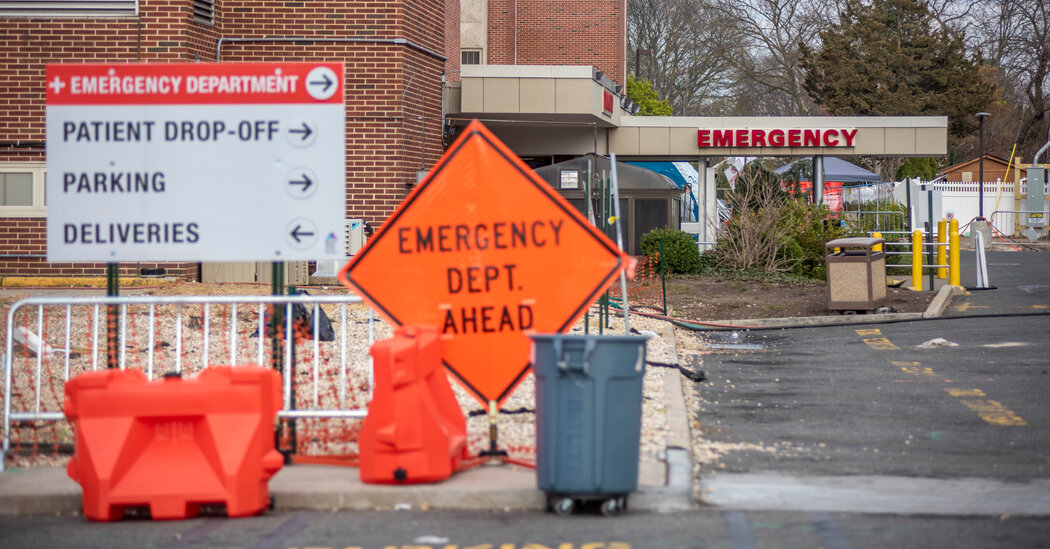C.D.C. Shortens Covid Isolation Period for Health Care Workers
The agency issued revised guidelines as Omicron cases climb, and hospitals grapple with worker shortages that have left wards understaffed.With rising concern over hospital staffing shortages as Omicron cases rapidly spread, the Centers for Disease Control and Prevention on Thursday shortened isolation periods for health care workers who contract Covid-19.The agency recommended that health care workers who are asymptomatic return to work after seven days and a negative test, adding that “isolation time can be cut further if there are staffing shortages.”The agency also said that those workers who had received all recommended vaccine doses, including boosters, do not need to quarantine at home following high-risk exposures.Many major hospital systems had already been forced to move ahead on their own in recent days, creating a patchwork of guidelines regarding infected workers in anticipation of a winter surge.The shortest such policy for returning to work — five days, with some other preconditions — is half the 10-day standard set earlier by the C.D.C. Other hospitals have settled on seven days as a safe window for infected staff members to return to work.The agency’s new recommendations do not apply to the public. Early in the pandemic, the C.D.C. had set a 14-day isolation period for infected Americans, to lower the risk of contagion, but then winnowed that back as more research confirmed that typical patient would be infectious for a shorter amount of time.Criticized for shifting guidance and mixed messaging, the C.D.C. decision to recommend the changes in isolation only to health care workers is likely to add to the confusion among Americans, especially since Britain issued a broad recommendation for shortened isolation on Wednesday that applies to everyone.Britain’s Health Security Agency cut the period for all infected individuals to seven days from 10 days, if they have twice tested negative with rapid antigen tests.Some medical experts pointed to limited evidence regarding when a person infected with the Omicron variant might no longer be contagious. But other researchers have been urging shorter periods and said that the C.D.C. revisions were overdue.“They are consistently behind in updating recommendations that are needed now, especially as we face the daunting prospect of a sudden surge in cases,” said Angela Rasmussen, a virologist at the Vaccine and Infectious Disease Organization at the University of Saskatchewan in Canada.Dr. Ashish Jha, dean of the Brown University School of Public Health, said it would make sense to shorten isolation times for the public, as well — especially for those who are vaccinated.“Given that a large proportion of health care workers, like other Americans, are going to get infected, finding a shorter period of time for isolation is critical,” said Dr. Jha.“I think we have reasonably good evidence with Delta that vaccinated people clear the virus far more quickly. There is no reason to believe that wouldn’t be true for Omicron.”Hospital administrators have stressed that the new changes allowing employees to resume work sooner would not put patients at risk.Given that health care workers are tested frequently, are largely vaccinated, and must be masked, “the chances of causing a significant amount of infections seem very low” if isolation periods are shortened, said Dr. Bob Wachter, chairman of the department of medicine at the University of California, San Francisco.“The consequences of keeping them out of the work force are massive when you think about the impact on health,” he added. U.C.S.F. also is weighing whether to reduce the isolation period to five days for workers: “I don’t know if five days saves us, but it’s better than seven and better than 10.”Dr. Jha stressed, though, that more research is needed to definitively answer questions regarding how long a person with an Omicron infection may remain infectious. The variant is far more contagious than previous versions of the coronavirus.Many of the new hospital policies also include requirements regarding testing, vaccination status and symptoms.In New York State, which has reported a seven-day average of more than 4,600 hospitalizations as Omicron cases soar, major hospitals recently changed isolation protocols for vaccinated employees.N.Y.U. Langone shortened its return-to-work policy to five days after a worker receives a positive test, or three days after a fever has subsided, whichever is longer. NewYork-Presbyterian reduced its isolation period to seven days. On Thursday, the Mount Sinai Health System also shifted to seven days from 10.“Guided by the latest science, our current protocols allow fully vaccinated employees to return to work after seven days,” said Joy Valenzuela, a spokesman for NewYork-Presbyterian. “Nothing is more important to us than the health and safety of our patients, visitors and staff.”Northwell Health’s guidelines now allow fully vaccinated workers to return to work eight days after a positive test or after symptom onset, if their symptoms are improving and they have not had a fever for 24 hours.The Coronavirus Pandemic: Key Things to KnowCard 1 of 5The holiday season.
Read more →
